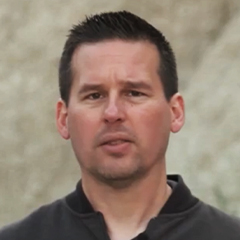
Must-Have Wildlife Photography Gear
Ian PlantA wildlife photographic adventure takes planning. What wildlife photography gear should you bring along on your adventure? In this free video, professional outdoor photographer, Ian Plant, shows you what essential gear he uses to capture memorable, wildlife images. Click here for more wildlife photography techniques.
Ian stresses three accessories for what he calls “good support.” First, a bean bag to rest on your car door or on the ground for telephoto lens support. Second, a gimbal head that swivels and pans when clamped to your tripod. Finally, a portable flash with an extender to help magnify the beam.
Join pro shooter, Ian Plant, as he gives you tips on selecting the appropriate wildlife photography gear for outdoor photography.
Wildlife photography is a bit more specialized than some other types of photography. And there's actually a wide range of accessories that are available to help you with your wildlife photography. But if I had to pick just three accessories that I think are absolutely critical to my wildlife photography, here's what they would be. First of all, good support is absolutely critical for great wildlife photography. And I've got two kinds of support here that I use all the time.
One is just very simple a bean bag. This is a skimmer sack that's the brand name for this particular type of bean bag, but there's plenty out there. And what you do is you fill it with rice or beans. In this case, I put a down jacket, a winter jacket inside this, which is a lot lighter than a bunch of beans in here, but offer a similar amounts of support. A lot of times when you're doing wildlife photography, you'll find that you're inside a vehicle for various reasons.
For example if you visit a place like Yellowstone National Park, a vehicle can operate as a moving blind, which allows you to get relatively close to the animals in a safe way. If you go on Safari in a place like Africa, more often than not, you're not allowed to get out of the vehicle for obvious reasons you don't wanna have a lion eating you. So you can hang one of these bean bags over the side of the door you just roll your window down and you put this down and you can use the sack to support your lens when you're doing photography of wildlife. And this set up basically allows you to get a lot of stability, without having to try to set up a tripod or a monopod inside the vehicle. This is also useful if you wanna get a ground level shot of wildlife, you can lay down on the ground.
You can throw the sack down and you can put the lens on top and get support. The second form of support. The second accessory that I find critical is what's known as a gimbal head and a gimbal head is specifically designed for wildlife photography. It swivels around on an axis, it pans around, and it also has the ability to pan up and down. So what you do is you mount your lens on the gimbal head, and then with the controls loosened, you can move in any direction up and down you can very easily pan with a moving subject.
And the great thing about the gimbal head is that if you've got everything, put on correctly you can set it up and then you can take your hands away and the head will stay in place. So I just need to push this forward a little bit more to balance the weight of this particular lens, but here I can basically point it any direction and it's gonna stay put, so this allows for very smooth and fluid motion, and it gives you a lot of support when you're photographing wildlife. My third critical wildlife photography accessory is a flash and this flash I've already put on a flash extender, which is a fresnel lens, which helps magnify the beam. And that will give you farther range when you're using flash. I don't always use the flash extender if I'm working with really distant wildlife, I'll put the flash extender on to make sure that the flash will reach that distant wildlife, more often than not, I'm actually working without the flash extender.
And the reason why I use flash is to add just a little bit of fill light to my wildlife subjects and to put a catch light in the eyes. So more often than not when I'm working with flash, I'm actually using the flash at reduced power using the flash compensation and dialing it down to maybe minus two so that the flash is just adding a little extra bit of light. It's not being used to be the primary light source on the subject because when you do that, the look can often be rather artificial. It just adds a little extra light. So when you're working with a wildlife subject, especially if that subject is back lit, the flash can help bring out the colors of the animal adds that little bit of fill light giving the animal a bit more emphasis in your composition and it'll add catch lights to the animal's eyes, which helps bring the animal to life in your photograph.
So these are the three accessories that I find most useful in my own wildlife photography.


Hi give me please name of a nice gimbal head what you use